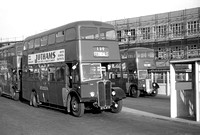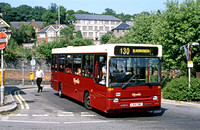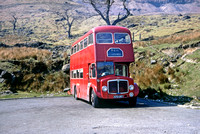Created 26-Apr-19
Here in these galleries you can find a history of the buses in the Rhondda, the services they operated and hopefully learn quite a bit about other aspects of the history of the area in the process.
The story is centred round services operated from Porth depot and covers in turn services operated by Rhondda Tramways, Rhondda Transport, Western Welsh, National Welsh and Rhondda Buses. In general the story ends with the takeover of Rhondda Buses by Stagecoach at the end of 1997 but there are a few photographs of the period after that date. The history includes any service that was operated by Rhondda at any time and also covers other operators' contributions to joint services. This joint operation extends further than you might expect!
The vehicle histories only deal with the vehicles bought by companies based at Porth, that is Rhondda Tramways, Rhondda Transport and Rhondda Buses. In the period between the end of Rhondda Transport's independent existence and the formation of Rhondda Buses, Porth was just one depot of first Western Welsh and then National Welsh. Vehicles bought new in that period will ultimately be covered in galleries on those operators. They still appear here, though, in the service galleries. Of course, Rhondda Buses took over quite a lot of buses from National Welsh and these DO make an appearance.
I have included the Caerphilly Busways vehicles in the Rhondda Buses fleet as it was a subsidiary, but the services will be covered as part of future planned galleries on the Caerphilly Area. Parfitt's only came into the Rhondda fold late on and also had a different operating area so neither their vehicles nor their operations are covered here and will be covered in future galleries. There are some minor exceptions on this as you will see.
The story starts with the introduction by Rhondda Tramways of the first tram services on 11th July 1908. Trolleybus operation commenced on a route from Williamstown to Gilfach Goch around 22nd December 1914 but only lasted until March 1915, becoming the shortest-lived UK trolleybus system. Motorbuses were introduced from 4th August 1920 and the fleet expanded quite rapidly, taking over from the last trams on 2nd February 1934 and becoming Rhondda Transport in June 1934. An unusual aspect of Rhondda's expansion is that they took over hardly any smaller independent operators, this happened only twice with I. Williams of Tynant Farm, Church Village being taken over in 1928 and Davies of Ynysybwl in 1936. Rhondda unusually also had an almost complete monopoly of services in its home valleys.
Rhondda Transport had always worked closely with Western Welsh and as they became part of the National Bus Company the rationalisation plans of the latter led to Rhondda being absorbed by Western Welsh from 31st December 1970. One might have expected that to be the end of the Rhondda name but it proved more durable than that and in the mid-seventies many of the buses at Porth received NBC-style Rhondda fleetnames. These disappeared with the takeover by Western Welsh of Red & White which led to the introduction of a new fleetname of National Welsh from 17th April 1978. Again, the Rhondda name re-appeared from 24th May 1981 as "New Rhondda" was used as the local identifier for buses operating from Porth following Market Analysis Project service revisions introduced from that date.
The New Rhondda identifier gradually faded out of use after deregulation of bus services from 26th October 1986. However, worse was to come as National Welsh went into receivership. Out of this, though, came the birth of Rhondda Buses from 5th February 1992 and the resurrection of the Rhondda name. Rhondda Buses were taken over by Stagecoach on 22nd December 1997 which is where this story ends.
My interest in Rhondda's buses was first sparked by a visit to Aberayron (as it was spelt then) back in 1966. This was almost the other extremity of Western Welsh's huge operating area and whilst there I bought a copy of the Western Welsh timetable, which happened to be the first issue to also include Rhondda services. The timetables sparked my curiosity with the long service up the Rhondda Fawr and services with strange timetables like the Maerdy to Maerdy Colliery workmen's service which ran very frequently for brief periods only at shift change times, a type of operation with which I was then unfamiliar. My first encounter with Rhondda was in late 1969 but a visit the following summer saw me experience the mass seaside excursion with almost forty buses at Barry and then, going to Porth itself travelling one of the few remaining back-loaders - one of the oldest double-deckers in the fleet in use on a Sunday as so many buses were at Barry! It was a few years later before I got to travel up to the head of the Rhondda Fawr and I was struck by the impressive setting - you will notice there are many photographs in that area.
My main objective is to cover the operations. Sadly many photographers spent little time away from Cardiff, Pontypridd or Porth and photographs of many of the more local services in the Rhondda are few and far between. In producing these galleries I would like to thank the many photographers who have willingly made their material available and made these galleries far more comprehensive than they would be otherwise - they are acknowledged on each photograph. I would welcome submission of original material that fills gaps in this story (there are plenty!) so if you have suitable material along with the right to publish it I would be welcome the opportunity to consider it for future updates to these galleries. I can be contacted by following the contact link in the menu bar at the top.
Finally I would like to give special thanks to John Jones, who not only has provided a very large number of photos for the gallery but has been at the end of what must have seemed an incessant stream of questions. However, I take exclusive credit for any mistakes and as this is meant to be a reference source, I welcome having them drawn to my attention to be corrected.
I hope you enjoy these galleries and find them interesting. If you do, please share with anyone else you think may similarly enjoy them.
The story is centred round services operated from Porth depot and covers in turn services operated by Rhondda Tramways, Rhondda Transport, Western Welsh, National Welsh and Rhondda Buses. In general the story ends with the takeover of Rhondda Buses by Stagecoach at the end of 1997 but there are a few photographs of the period after that date. The history includes any service that was operated by Rhondda at any time and also covers other operators' contributions to joint services. This joint operation extends further than you might expect!
The vehicle histories only deal with the vehicles bought by companies based at Porth, that is Rhondda Tramways, Rhondda Transport and Rhondda Buses. In the period between the end of Rhondda Transport's independent existence and the formation of Rhondda Buses, Porth was just one depot of first Western Welsh and then National Welsh. Vehicles bought new in that period will ultimately be covered in galleries on those operators. They still appear here, though, in the service galleries. Of course, Rhondda Buses took over quite a lot of buses from National Welsh and these DO make an appearance.
I have included the Caerphilly Busways vehicles in the Rhondda Buses fleet as it was a subsidiary, but the services will be covered as part of future planned galleries on the Caerphilly Area. Parfitt's only came into the Rhondda fold late on and also had a different operating area so neither their vehicles nor their operations are covered here and will be covered in future galleries. There are some minor exceptions on this as you will see.
The story starts with the introduction by Rhondda Tramways of the first tram services on 11th July 1908. Trolleybus operation commenced on a route from Williamstown to Gilfach Goch around 22nd December 1914 but only lasted until March 1915, becoming the shortest-lived UK trolleybus system. Motorbuses were introduced from 4th August 1920 and the fleet expanded quite rapidly, taking over from the last trams on 2nd February 1934 and becoming Rhondda Transport in June 1934. An unusual aspect of Rhondda's expansion is that they took over hardly any smaller independent operators, this happened only twice with I. Williams of Tynant Farm, Church Village being taken over in 1928 and Davies of Ynysybwl in 1936. Rhondda unusually also had an almost complete monopoly of services in its home valleys.
Rhondda Transport had always worked closely with Western Welsh and as they became part of the National Bus Company the rationalisation plans of the latter led to Rhondda being absorbed by Western Welsh from 31st December 1970. One might have expected that to be the end of the Rhondda name but it proved more durable than that and in the mid-seventies many of the buses at Porth received NBC-style Rhondda fleetnames. These disappeared with the takeover by Western Welsh of Red & White which led to the introduction of a new fleetname of National Welsh from 17th April 1978. Again, the Rhondda name re-appeared from 24th May 1981 as "New Rhondda" was used as the local identifier for buses operating from Porth following Market Analysis Project service revisions introduced from that date.
The New Rhondda identifier gradually faded out of use after deregulation of bus services from 26th October 1986. However, worse was to come as National Welsh went into receivership. Out of this, though, came the birth of Rhondda Buses from 5th February 1992 and the resurrection of the Rhondda name. Rhondda Buses were taken over by Stagecoach on 22nd December 1997 which is where this story ends.
My interest in Rhondda's buses was first sparked by a visit to Aberayron (as it was spelt then) back in 1966. This was almost the other extremity of Western Welsh's huge operating area and whilst there I bought a copy of the Western Welsh timetable, which happened to be the first issue to also include Rhondda services. The timetables sparked my curiosity with the long service up the Rhondda Fawr and services with strange timetables like the Maerdy to Maerdy Colliery workmen's service which ran very frequently for brief periods only at shift change times, a type of operation with which I was then unfamiliar. My first encounter with Rhondda was in late 1969 but a visit the following summer saw me experience the mass seaside excursion with almost forty buses at Barry and then, going to Porth itself travelling one of the few remaining back-loaders - one of the oldest double-deckers in the fleet in use on a Sunday as so many buses were at Barry! It was a few years later before I got to travel up to the head of the Rhondda Fawr and I was struck by the impressive setting - you will notice there are many photographs in that area.
My main objective is to cover the operations. Sadly many photographers spent little time away from Cardiff, Pontypridd or Porth and photographs of many of the more local services in the Rhondda are few and far between. In producing these galleries I would like to thank the many photographers who have willingly made their material available and made these galleries far more comprehensive than they would be otherwise - they are acknowledged on each photograph. I would welcome submission of original material that fills gaps in this story (there are plenty!) so if you have suitable material along with the right to publish it I would be welcome the opportunity to consider it for future updates to these galleries. I can be contacted by following the contact link in the menu bar at the top.
Finally I would like to give special thanks to John Jones, who not only has provided a very large number of photos for the gallery but has been at the end of what must have seemed an incessant stream of questions. However, I take exclusive credit for any mistakes and as this is meant to be a reference source, I welcome having them drawn to my attention to be corrected.
I hope you enjoy these galleries and find them interesting. If you do, please share with anyone else you think may similarly enjoy them.
© David Beilby
Rhondda Transport vehicles
Galleries 32
Collections 3
Modified 11-Jun-24
780 photos

Rhondda Buses Limited vehicles
Galleries 8
Collections 27
Modified 11-Jun-24
174 photos

Rhondda Bus Routes
Collections 31
Modified 9-Mar-24
0 photos

Rhondda publicity and tickets
Galleries 2
Modified 9-Mar-24
38 photos

Rhondda additions
Visitors 232
13 photos
Created 28-Dec-25
Modified 28-Dec-25
